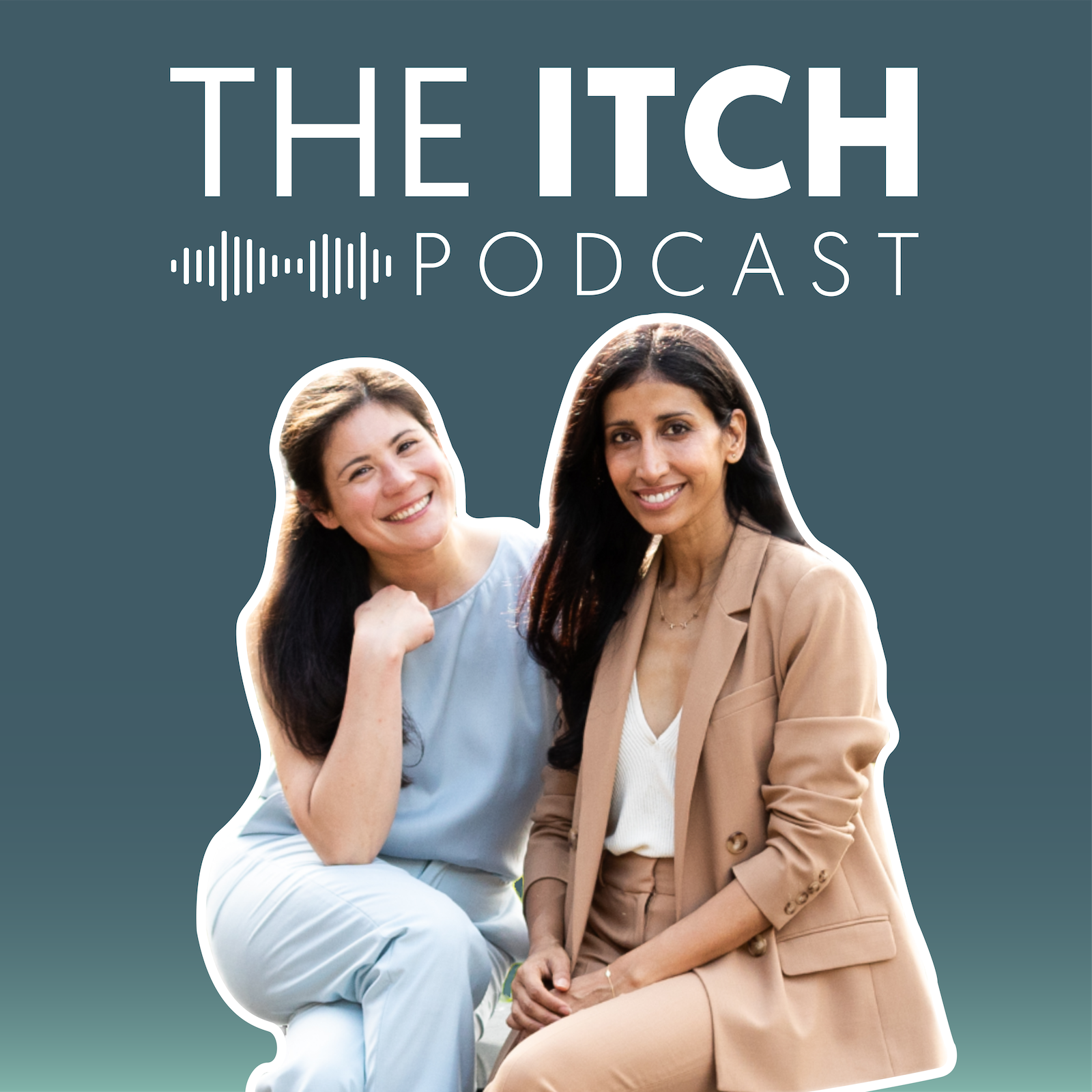Episodes

Thursday Aug 21, 2025
#125 - Parents’ Guide to Asthma Peak Week
Thursday Aug 21, 2025
Thursday Aug 21, 2025
As September approaches, many families notice asthma symptoms getting worse. Ragweed pollen, viral infections, cooler nights, and the stress of back-to-school routines all combine to create Asthma Peak Week, a time when asthma attacks and ER visits spike across the country.
Asthma mom, Sherrina Gibson, joins us to share how her family prepares her 11-year-old daughter for fall asthma challenges. She talks about cleaning routines, school planning, and teaching her daughter self-awareness and empowerment. Dr. Payel Gupta adds medical guidance on asthma action plans and seasonal medication adjustments.
You’ll learn how to spot asthma triggers, prepare your home and school, and teach children to recognize symptoms early so they can act before a flare gets worse.
What we cover in our episode about preparing for asthma peak week:
-
Parenting with asthma: Sherrina Gibson shares her family’s journey and how they prepare their home and routines each fall.
-
Asthma management strategies: Cleaning, decluttering, updating medications, and coordinating with schools and coaches.
-
Asthma Peak Week explained: Why symptoms spike in September and how to get ahead of it.
-
Asthma action plans: Why every family needs one and how to keep copies at home, school, and on the go.
-
Empowering kids with asthma: Teaching children to recognize symptoms, use their inhaler properly, and advocate for themselves at school and in sports.
More episodes about asthma
- Ep. 81: Why asthma attacks rise in September peak week
- Ep. 58: What is controlled Asthma? - Everything you need to know!
- Ep. 117: As-Needed Albuterol–Budesonide in Mild Asthma (BATURA Trial)
- Ep. 124: Asthma peak week and understanding triggers
Made in partnership with The Allergy & Asthma Network.
Thanks to AstraZeneca and Amgen for sponsoring today’s episode.
This podcast is for informational purposes only and does not substitute professional medical advice. Always consult with your healthcare provider for any medical concerns.

Thursday Aug 14, 2025
#124 - Asthma peak week and understanding triggers
Thursday Aug 14, 2025
Thursday Aug 14, 2025
As summer winds down and September approaches, many people with asthma notice their symptoms getting worse. This is no coincidence as more asthma triggers appear during this time of year, from pollen and viruses to stress and weather changes. This combination peaks during Asthma Peak Week, a time when asthma attacks and ER visits spike across the country.
Allergist Dr. Kristin Sokol joins us to discuss seasonal asthma triggers, why fall can be especially risky, and how you can prepare to keep your asthma under control.
You’ll learn how to identify your personal triggers, steps to reduce your exposure, and why staying consistent with your medication routine is critical. We also cover tools like an asthma action plan, preparing for school, and making sure caregivers and teachers know how to respond to an asthma flare.
What we cover in our episode about managing asthma triggers during the fall:
- Understanding asthma: learn why even mild asthma should be reviewed before the fall.
- Identifying triggers: from indoor allergens to seasonal pollen and surprising emotional triggers, know what can set off your asthma.
- Preparing for Asthma Peak Week: discover how viruses, ragweed pollen, and stress combine into a dangerous flare period and how to get ahead of it.
- Staying in control: strategies to avoid or reduce asthma trigger exposure, prepare for school, and keep your asthma action plan up to date.
- Supporting everyone with asthma: special considerations for adults, caregivers, and teachers to stay healthy and ready year-round.
More episodes about asthma
- Ep. 81: Why asthma attacks rise in September peak week
- Ep. 58: What is controlled Asthma? - Everything you need to know!
- Ep. 117: As-Needed Albuterol–Budesonide in Mild Asthma (BATURA Trial)
Made in partnership with The Allergy & Asthma Network.
Thanks to AstraZeneca and Amgen for sponsoring today’s episode.
This podcast is for informational purposes only and does not substitute professional medical advice. Always consult with your healthcare provider for any medical concerns.

Friday Aug 08, 2025
#123: Supporting the Mental Health of Allergy Parents
Friday Aug 08, 2025
Friday Aug 08, 2025
Parenting a child with food allergies can feel overwhelming and isolating. We're joined by licensed therapist and food allergy mom Tamara Hubbard, MA, LCPC, to talk about her new book, May Contain Anxiety, and the often overlooked mental health challenges that food allergy parents face.
We explore how chronic stress, fear, and anxiety can affect parenting, relationships, and family dynamics. Plus, why supporting the mental health of allergy parents is crucial for the entire family’s well-being.
Tamara breaks down evidence-based tools from Acceptance and Commitment Therapy (ACT) to help parents manage food allergy anxiety, build confidence, and feel less alone on this lifelong journey.
What we cover in this episode about food allergy anxiety in parents:
- Tamara’s journey from substance abuse counselor to food allergy mental health advocate
- Why she wrote May Contain Anxiety and how it’s different from typical self-help books
- A breakdown of Acceptance and Commitment Therapy (ACT) and how it supports allergy parents
- The impact of food allergy anxiety on the whole family system, from parenting dynamics to sibling relationships
- Why this book is valuable for every stage of the allergy journey and helpful for allergists and extended family, too
May Contain Anxiety is available worldwide in English on September 30th, 2025.
Get 30% off by buying it at Hopkins Press and using the code: HMCA25

Thursday Jul 31, 2025
Thursday Jul 31, 2025
Do adults with chronic spontaneous urticaria (CSU) have a higher risk of death over time compared to people without hives?
We review the findings from “Mortality in adult patients with chronic spontaneous urticaria: A real-world cohort study,” published in April 2025, in The Journal of Allergy and Clinical Immunology. While CSU is often considered a non-life-threatening condition, this large study found something surprising: people with CSU had a significantly higher risk of death, especially from suicide.
Dr. G and Dr. Blaiss walk through key takeaways from a dataset of over 272,000 CSU patients and nearly 13 million matched controls. They explore what the results mean for mortality risk, clinical care, mental health screening, and the importance of proper, guideline-based treatment.
What we cover in our episode about CSU and mortality risk:
- What is CSU? Chronic hives are an unpredictable, itchy, and sometimes painful condition. It lasts for 6 weeks or longer and can continue for years.
- Mental health connection: CSU affects more than skin. Anxiety, depression, and suicidal thoughts are common and serious concerns.
- Study findings: CSU was associated with higher mortality at 3 months, 1 year, and 5 years. Suicide risk was over 3 times higher than in people without CSU.
- Demographics: Younger and White patients with CSU had the highest increase in risk.
- Treatment impact: Patients using guideline-recommended treatments like second-generation antihistamines or omalizumab had lower death rates.
The Itch Review, hosted by Dr. Gupta, Kortney, and Dr. Blaiss, explores allergy and immunology studies, breaking down complex research in conversations accessible to clinicians, patients, and caregivers. Each episode provides key insights from journal articles and includes a one-page infographic in the show notes for easy reference.
Made in partnership with The Allergy & Asthma Network.
Thanks to Novartis for sponsoring today’s episode.
This podcast is for informational purposes only and does not substitute professional medical advice. Always consult with your healthcare provider for any medical concerns.

Thursday Jul 24, 2025
#121 - Avapritinib versus Placebo in Indolent Systemic Mastocytosis - PIONEER Trial
Thursday Jul 24, 2025
Thursday Jul 24, 2025
What happens when you target the root cause of indolent systemic mastocytosis?
In this episode of The Itch Review, we unpack key findings from the article “Avapritinib versus Placebo in Indolent Systemic Mastocytosis,” published on May 23, 2023, in NEJM Evidence.
Indolent Systemic Mastocytosis (ISM) is a rare chronic disease with life-altering symptoms. Until recently, treatment options were limited. We break down new data from Part 2 of the PIONEER study, which evaluated Avapritinib, a targeted therapy designed to inhibit the KIT D816V mutation that drives ISM.
Dr. Gupta and Dr. Blaiss explain how Avapritinib works, how the study was designed, and what outcomes were measured, including the Total Symptom Score (TSS). Most importantly, we explore what this treatment could mean for patients with moderate to severe ISM.
What we cover in our episode about avapritinib versus placebo:
- Understanding ISM: How the KIT D816V mutation causes overproduction and overactivation of mast cells.
- Why current treatment falls short: The limitations of best supportive care and why many patients remain symptomatic despite multiple medications.
- How Avapritinib works: A tyrosine kinase inhibitor that targets the KIT mutation directly, aiming to reduce mast cell activation at its source.
- Inside the PIONEER trial: Study design, eligibility criteria, and how outcomes like Total Symptom Score (TSS) and serum tryptase were measured.
- What the data showed: Improvements in symptoms, lab markers, and quality of life and what this could mean for long-term ISM care.
The Itch Review, hosted by Dr. Gupta, Kortney, and Dr. Blaiss, explores allergy and immunology studies, breaking down complex research in conversations accessible to clinicians, patients, and caregivers. Each episode provides key insights from journal articles and includes a one-page infographic in the show notes for easy reference.
Made in partnership with The Allergy & Asthma Network.
Thanks to Blueprint Medicines for sponsoring today’s episode.
This podcast is for informational purposes only and does not substitute professional medical advice. Always consult with your healthcare provider for any medical concerns.
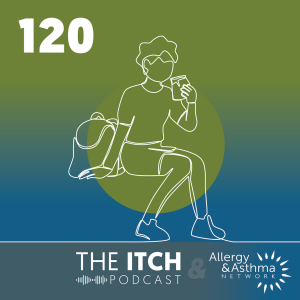
Thursday Jul 10, 2025
Thursday Jul 10, 2025
Is it too early to start planning for school when summer has just begun? Not if your child has food allergies.
Dr. Nikki Chase, a board-certified allergist-immunologist, joins us to share what families need to know to prepare for a safe and successful school year. From school forms and emergency plans to when to self-carry epinephrine and how to teach self-advocacy, this episode is filled with practical, real-life guidance.
We discuss how to make the most of your summer doctor visits, why early planning matters, and how newer epinephrine options, like the nasal spray, may help reduce fear and delay in use. You’ll also hear Dr. Chase’s advice on helping kids build confidence and take ownership of their allergy care.
What we cover in our episode about preparing for school with food allergies:
- 504 plans explained: What they are, how to request one, and why they matter for legal protection and clear school accommodations.
- Anaphylaxis Action Plans: What’s included, how they differ from 504 plans, and why they take the guesswork out of emergencies.
- Epinephrine device options: From auto-injectors to nasal spray, what’s available and how to choose the best fit for your child.
- What to work on this summer to build allergy confidence: The rules, responsibilities, and privileges kids should practice to stay safe and feel more in control.
- Self-advocacy & communication tips: How to help your child speak up, navigate cafeteria dynamics, and respond to food allergy bullying.
More resources about back-to-school with food allergies
- Planning for School with Food Allergies
- School Plans for Students with Food Allergies
- Managing Allergies in Schools: A Guide for Staff
- Epinephrine for Anaphylaxis: What Treatments are Available?
- Food Allergy Treatment & Management
Produced in partnership with The Allergy & Asthma Network. Thanks to ARS Pharma for sponsoring this episode.
This podcast is for informational purposes only and does not substitute professional medical advice. Always consult with your healthcare provider for any medical concerns.
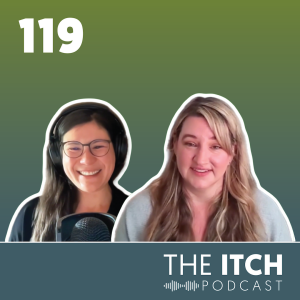
Friday Jul 04, 2025
Friday Jul 04, 2025
Have you ever wondered what happens after an anaphylactic reaction?
How do you process everything that went down, from ingesting the allergen to using epinephrine? In this candid conversation, Kortney sits down with Tamara Hubbard, a licensed clinical professional counselor, to unpack the emotional aftermath of a severe allergic reaction.
Kortney shares her own recent experience of self-administering epinephrine for the first time after over 30 years of living with food allergies. Together, they explore how guilt, self-doubt, and family dynamics can shape recovery and how to move forward without letting fear or shame take over.
What we cover in this episode about processing an anaphylactic reaction:
- The moment Kortney realized she needed to self-inject epinephrine and why it felt empowering.
- Why it’s common to second-guess yourself during an allergic reaction.
- The unique guilt and blame that can surface after a reaction, even when you did everything right.
- How to handle well-meaning but unhelpful comments from family and friends.
- Tips for processing the event without letting it define your future.
About Our Guest
Tamara Hubbard, MA, LCPC is a licensed clinical professional counselor and the founder of the Food Allergy Counselor Directory & Website. She specializes in helping individuals and families navigate the emotional and mental health challenges that come with managing food allergies. Tamara is passionate about empowering people to build confidence and resilience while living safely with food allergies.
Learn more about Tamara’s work at FoodAllergyCounselor.com.
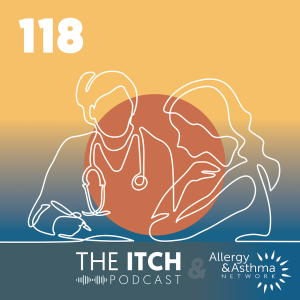
Thursday Jun 26, 2025
Thursday Jun 26, 2025
Do patients and their healthcare teams view the impact of indolent systemic mastocytosis on quality of life in the same way?
In this episode of The Itch Review, we unpack key findings from a May 4, 2025, descriptive study from The Journal of the Advanced Practitioner in Oncology, “Patient and Advanced Practitioner Perspectives on Symptom Burden and Symptom Management in Indolent Systemic Mastocytosis.”
Is there a disconnect between what patients feel and what providers think when it comes to indolent systemic mastocytosis (ISM)? A new study suggests yes, revealing a mismatch between how patients and advanced practitioners (APs) perceive disease control and what that means for care. This episode dives into whether research like this could help bridge the gap between patient experience and clinical perspective.
What we cover in our episode about the indolent systemic mastocytosis:
- Understanding ISM: What makes indolent systemic mastocytosis a unique multisystem condition?
- Symptom burden explained: Frequency, severity, duration, distress, and functional interference.
- Patient vs practitioner views: Understanding the most impactful symptoms differs from patient to AP.
- Practical tools: The Indolent Systemic Mastocytosis-Symptom Assessment Form (ISM-SAF) is a validated instrument that can be used to determine symptoms and severity.
- Barriers and solutions: Why tracking symptoms is hard and how clinics can improve coordination.
- AP-focused Toolkit: Resources to help nurse practitioners, PAs, and pharmacists provide patient-centered ISM care.
***
The Itch Review, hosted by Dr. Gupta, Kortney, and Dr. Blaiss, explores the latest allergy and immunology studies, breaking down complex research in conversations accessible to clinicians, patients, and caregivers. Each episode provides key insights from journal articles and includes a one-page infographic in the show notes for easy reference.
***
This podcast is made in partnership with The Allergy & Asthma Network.
Thanks to Blueprint Medicines for sponsoring today’s episode.
This podcast is for informational purposes only and does not substitute professional medical advice. Always consult with your healthcare provider for any medical concerns.
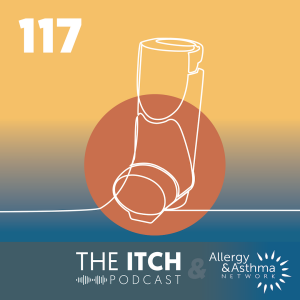
Thursday Jun 19, 2025
#117 - BATURA Trial: Does a Combo Inhaler Help Mild Asthma?
Thursday Jun 19, 2025
Thursday Jun 19, 2025
There have been countless advances in controller therapies for asthma, but our go-to rescue inhaler, a quick-relief bronchodilator, hasn’t changed in decades.
In this episode of The Itch Review, we spotlight “As-Needed Albuterol–Budesonide in Mild Asthma” published in The New England Journal of Medicine, May 19, 2025. This article looks at the BATURA trial, which tested whether adding budesonide to albuterol rescue inhalers cuts exacerbations in adults whose mild asthma remains uncontrolled on occasional albuterol/short-acting beta agonist (SABA) therapy.
Could this combo inhaler really cut severe asthma attacks in people with mild disease?
What we cover in our episode about the BATURA trial:
- Understanding asthma: In asthma, your airways both tighten up and get swollen. Treating both the tightness and the swelling right when you feel symptoms could stop a full-blown attack.
- All-online trial: BATURA used telehealth to enroll 2,516 people with mild asthma from across the U.S. and ran the study until it saw a preset number of 172 serious attacks.
- Big takeaways: The combo inhaler cut serious attacks by almost half, halved yearly flare-ups, and slashed steroid use by 63%. All without people needing to use their medication more often.
- Why it ended early: An independent safety board reviewed the data mid-trial and concluded that the combo inhaler was so clearly better that it would’ve been unfair to continue giving anyone the old treatment.
- What’s next: We still need studies on teens and children to ensure that these same benefits hold true for younger patients.
***
The Itch Review, hosted by Dr. Gupta, Kortney, and Dr. Blaiss, explores the latest allergy and immunology studies, breaking down complex research in conversations accessible to clinicians, patients, and caregivers. Each episode provides key insights from journal articles and includes a one-page infographic in the show notes for easy reference.
***
This podcast is made in partnership with The Allergy & Asthma Network.
Thanks to AstraZeneca for sponsoring today’s episode.
This podcast is for informational purposes only and does not substitute professional medical advice. Always consult with your healthcare provider for any medical concerns.
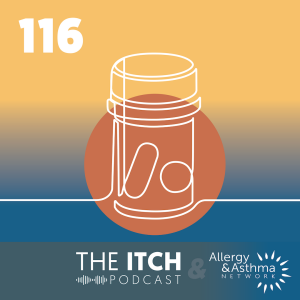
Thursday Jun 12, 2025
#116 - Why Fexofenadine Is Considered a Truly Non-Sedating Antihistamine
Thursday Jun 12, 2025
Thursday Jun 12, 2025
Have you ever wondered whether fexofenadine (Allegra®) really doesn’t make you drowsy?
In this episode of The Itch Review, we dissect a July 2024 systematic review from Current Medical Research & Opinion, “Why fexofenadine is considered a truly non-sedating antihistamine with no brain penetration.”
This rigorous systematic review pools over 60 human studies from PET brain-scan trials and Proportional Impairment Ratio (PIR) tests to driving-simulator research and real-world quality-of-life surveys. It looks to answer one question: Does fexofendine ever sneak past the blood–brain barrier and slow you down like first-generation allergy meds?
This episode looks at the evolution of H1 antihistamines from first-generation drugs like diphenhydramine to today’s second-generation options (cetirizine, loratadine, and fexofenadine) to show how each interacts with the blood–brain barrier (BBB) and why that matters for sedation.
We highlight the review’s key studies:
- PET Imaging: Measuring H1-receptor occupancy. Fexofenadine registers <1%, even at high doses
- PIR Analyses: Proportional Impairment Ratio tests show virtually zero cognitive or motor impairment when taking fexofenadine
- Driving & Aviator Trials: Side-by-side comparisons with diphenhydramine, alcohol, and fexofenadine
Finally, we dive into real-world outcomes on reaction times, work-and-school performance, pediatric safety, and even NASA’s approval for pilot use.
GET THE INFOGRAPHIC TO FOLLOW ALONG
***
The Itch Review, hosted by Dr. Gupta, Kortney, and Dr. Blaiss, explores the latest allergy and immunology studies through 30-minute conversations that are accessible for everyone. This podcast aims to support busy clinicians, patients, and caregivers in staying updated on current research. Each episode provides valuable insights from key journal articles and includes a convenient one-page infographic in the show notes for easy reference.
***
This podcast is made in partnership with The Allergy & Asthma Network.
Thanks to Opella for sponsoring today’s episode.
This podcast is for informational purposes only and does not substitute professional medical advice. Always consult with your healthcare provider for any medical concerns.

